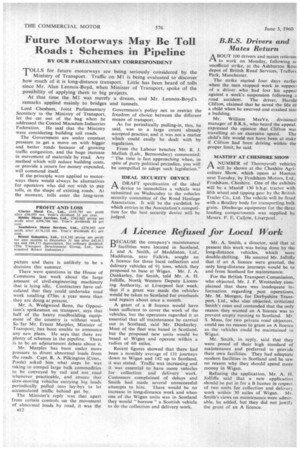Future Motorways May Be Toll Roads : Schemes in Pipeline
Page 46

If you've noticed an error in this article please click here to report it so we can fix it.
BY OUR PARLIAMENTARY CORRESPONDENT TOLLS for future motorways are being seriously considered by the
Ministry of Transport. Traffic on MI is being evaluated to discover how much of it is long-distance transport. Little has been heard of tolls since Mr. Alan Lennox-Boyd, when Minister of Transport, spoke of the possibility of applying them to big projects.
At that time the MI was merely a dream, and Mr. Lennox-Boyd's remarks applied mainly to bridges and tunnels.
Lord Chesham, Joint Parliamentary Secretary to the Ministry of Transport, let the cat out of the bag when he addressed the Coated Macadam Industries Federation. He said that the Ministry were considering building toll roads.
The Government are under constant pressure to get a move on with bigger and better roads because of growing traffic congestion, and the huge increase in movement of materials by road. Any method which will reduce building costs, or provide a return for money expended, will commend itself.
If the principle were applied to motorways there would always be alternatives for operators who did not wish to pay tolls, in the shape of existing. roads. At the moment, tolls enter the long-term
picture and there is unlikely to be a decision this summer.
There were questions in the House of Commons last week about the large amount of civil-engineering machinery that is lying idle. Contractors have calculated that they could undertake road work totalling 03m. a year more than they are doing at present.
Mr. A. Wedgwood Benn, the Opposition's spokesman on transport, says that half of the heavy roadbuilding equipment of the country is without work. So far Mr. Ernest Marples, Minister of Transport, has been unable to announce any new plans. He says that there are plenty of schemes in the pipeline. There is to be an adjournment debate about it.
Mr. Marples has been under more pressure to divert abnormal loads from the roads. Capt. R. A. Pilkington (Cons„ Poole) asked him what steps he was taking to compel large bulk commodities to be conveyed by rail and not road whenever practicable, and ensure that slow-moving vehicles carrying big loads periodically pulled into lay-bys to let accumulated traffic behind get by.
The Minister's reply was that apart from certain controls on the movement of abnormal loads by road, it was the ol2 Government's policy not to restrict the freedom of choice between the different means of transport.
As for periodically pulling-in, this, he said, was to a large extent already accepted practice, and it was not a matter which could easily be dealt with by regulation.
From the Labour benches Mr. R. J. Mellish (Lab., Bermondsey) commented: "The time is fast approaching when, in spite of party political prejudice, you will be compelled to adopt such legislation."
IDEAL SECURITY DEVICE r't
A DRAFT specification of the ideal
device to immobilize a vehicle was submitted on Wednesday to the vehicles security committee of the Road Haulage Association. It will be the yardstick by which entries in the Association's competition for the best security device will be judged.
















































































































